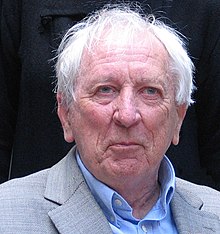Tomas Tranströmer

Tomas Tranströmer (born 15 April 1931 in Stockholm) is a Swedish writer, poet and translator, whose poetry has been deeply influential in Sweden, as well as around the world.
Tranströmer received his secondary education at the Södra Latin School in Stockholm and graduated as a psychologist from Stockholm University in 1956. He began writing at thirteen, and published his first collection of poems, 17 dikter (Seventeen Poems) in 1954. An English translation by Robin Fulton of his entire body of work, New Collected Poems, was published in the UK in 1997. Following the publication of Den stora gåtan (The Great Enigma), Fulton's edition was expanded into The Great Enigma: New Collected Poems, published in the US in 2006. He published a short autobiography, Minnena ser mig (The memories are watching me), in 1993.
Other poets - especially in the "political" 70's - accused him for being apart from his tradition and not including political issues in his poems and novels. His work, though, lies within and further develops the Modernist and Expressionist/Surrealist language of 20th century poetry; his clear, seemingly simple pictures from everyday life and nature in particular reveals a mystic insight to the universal aspects of the human mind.
Tranströmer and the American poet Robert Bly are close friends and their correspondence has been published in the book Air Mail.
In 1990, he suffered a stroke that affects his speech, but he continues to write. Tranströmer has in the past been mentioned as a candidate for the Nobel Prize in Literature,[1] and many consider him one of Sweden's foremost poets. Tranströmer's awards include the Bonnier Award for Poetry, the Neustadt International Prize for Literature, the Oevralids Prize, the Petrach Prize in Germany,the Golden Wreath of the Struga Poetry Evenings and the Swedish Award from International Poetry Forum. His poetry has been translated into fifty languages; Bly, Robin Fulton, and the prominent American blues writer Samuel Charters have translated his work into English.
In 2007, Tranströmer received a special Lifetime Recognition Award given by the trustees of the Griffin Trust for Excellence in Poetry, which also awards the annual Griffin Poetry Prize.
In addition to his work as a writer, Tranströmer was also a respected psychologist before he had his stroke. He worked in juvenile prisons, and with disabled, convicts, and drug addicts. He is also a good piano player, something he has been able to continue after his stroke, albeit with one hand.
Swedish Collections
- 17 dikter (1954) - Seventeen Poems
- Hemligheter på vägen (1958)
- Den halvfärdiga himlen (1962) - The Half-Finished Heaven
- Klanger och spår (1966) - Windows and Stones
- Mörkerseende (1970) - Night Vision
- Stigar (1973) - Paths
- Östersjöar (1974) - Baltics
- Sanningsbarriären (1978)
- Det vilda torget (1983)
- För levande och döda (1989) - For the Living and the Dead
- Sorgegondolen (1996)
- Den stora gåtan (2004)
- Galleriet: Reflected in Vecka nr.II (2007)- an artist book by Modhir Ahmed
Selected Books in English Translation
- 20 Poems (Robert Bly, trans.)
- Windows and Stones (May Swenson, trans.)
- Baltics (Samuel Charters, trans.)
- The Half-Finished Heaven (Robert Bly, trans.)
- New Collected Poems (Robin Fulton, trans.)
- The Great Enigma: Collected Poems (Robin Fulton, trans.)
- The Sorrow Gondola (Michael McGriff and Mikaela Grassl, trans.)
References
- ^ "Poet tipped in Nobel prize for literature: Swedish poet Tomas Tranströmer declared favourite...". The Guardian. 30 September 2010.
